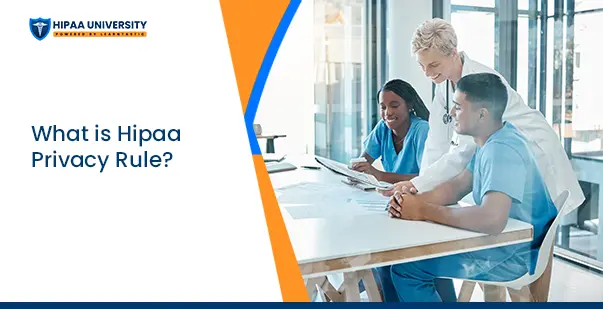What is the HIPAA Privacy Rule?

October 3, 2024
Table of Contents
- Introduction
- What is the HIPAA Privacy Rule?
- Who Enforces HIPAA Privacy Rules?
- Importance of HIPAA Privacy Rule
- Rights Covered Under HIPAA Privacy Rule
- Who Must Comply with HIPAA Privacy Rule
- HIPAA Training for Covered Entities
- Is There Any Penalty for HIPAA Violation?
- Conclusion
In today’s healthcare system, protecting patients’ data is more critical than ever, and the HIPAA Privacy Rule is an essential tool to ensure this. The Health Insurance Portability and Accountability Act (HIPAA) is a revolutionary act established over 28 years ago. However, among many of its rules, the HIPAA Privacy Rule became effective in April 2003 in the healthcare industry. It has completely changed how patient data is managed by establishing guidelines for handling personal health information (PHI).
The HIPAA privacy rule guarantees that people have legal control over their health information and holds healthcare institutions responsible for securing confidential patient information.
In this article, we are going to discuss HIPAA privacy rules, their significance in modern healthcare, and other factors.
What is the HIPAA Privacy Rule?
The HIPAA Privacy Rule is a critical component of the 1996 Health Insurance Portability and Accountability Act, which was established to ensure the privacy of protected health information (PHI).
This regulation establishes nationwide guidelines for the use and exchange of patient data and applies to clearinghouses, health plans, healthcare providers, and their commercial relationships.
Moreover, the rule imposes strict limitations on how healthcare entities can share PHI without patient consent. While data may be shared for treatment or payment purposes, any other disclosures—such as marketing—require explicit patient approval. Some of the major aspects of the HIPAA Privacy Rule are:
- The rule sets a federal standard with uniformity concerning the protection of medical records and PHI in health care.
- It will enable them to see their health information, request corrections, and manage how the data is used.
- The HIPAA Privacy Rule mandates that covered entities apply physical and technical safeguards to prevent unwanted access to PHI.
- The Privacy Rule creates a minimal standard of privacy protection, which enables governments and institutions to enact more stringent guidelines.
Who Enforces HIPAA Privacy Rules?
The Office for Civil Rights (OCR) of the United States Department of Health and Human Services (HHS) is responsible for enforcing the HIPAA Privacy Rule. The OCR ensures compliance through public complaints, HIPAA audits, and breach notifications from covered entities.
Internally, each organization appoints a Privacy Officer responsible for conducting risk assessments, implementing policies, training staff, and managing privacy-related violations.
The Privacy Officer ensures that the organization complies with HIPAA’s privacy requirements, while the OCR oversees external enforcement, ensuring robust protection of patient health information.
Importance of the HIPAA Privacy Rule
The HIPAA Privacy Rule establishes a foundation for protecting patient privacy and ensuring the proper handling of sensitive health information. It sets a national standard, or “federal floor,” for privacy protections, requiring healthcare organizations to comply unless stricter state laws are in place.
Establishing such protections allows the HIPAA Privacy Rule to give individuals control over who may access their health data and how such information is going to be used. Some of the key benefits of HIPAA Privacy Rules are:
- Enhances Data Security: HIPAA mandates strict administrative, technical, and physical safeguards to protect sensitive health data, such as personal details and medical records.
- Improves Standardization: It simplifies the transfer of information between healthcare providers and ensures a seamless and secure exchange of patient data.
- Empowers Patient: Patients have the legal right to access their health records within 30 days. This ensures better care coordination and transparency in healthcare.
- Improves Responsibility: Covered entities face severe penalties, including fines and criminal charges, if they fail to protect patient information.
Compliance with the HIPAA Privacy Rule strengthens security measures, streamlines data management, and builds patient trust by ensuring that sensitive information remains secure and private.
Rights Covered Under HIPAA Privacy Rule
The rights covered under the HIPAA Privacy Rule not only facilitate access to personal health data but also ensure that patients are informed about how their information is used. The key rights covered under the HIPAA Privacy Rule:
- Access to PHI: Patients have the right to request and obtain a copy of their health records from covered entities. They may also provide these organizations instructions on who or what to send their PHI to.
- Timely Response: Covered entities are required to respond to PHI requests within 30 days. While providing these copies may incur reasonable costs, they must be done promptly.
- Limited Denials: In rare cases, a request may be denied—such as when disclosing information could endanger someone’s safety or if the data is not part of the designated record set.
In addition to these rights, the HIPAA Privacy Rule ensures:
- Notice of Privacy Practices: Medical practitioners are required to inform patients of their rights and the intended use of their PHI.
- Patient Authorization: Patients have the right to decide whether to allow or prohibit the use and sharing of their PHI for specific uses.
- Minimum Necessary Standard: Organizations must only use, disclose, or seek PHI as little as necessary for the intended purpose.
- Administrative Safeguards: Covered entities are required to appoint a Privacy Officer who oversees policies, procedures, and protections for maintaining PHI privacy.
These rights ensure that patients have more control over their health data while encouraging healthcare providers to maintain rigorous privacy and security standards.
Who Needs to Follow the HIPAA Privacy Rules
The HIPAA Privacy Rule applies to various organizations and individuals who handle protected health information (PHI). These are generally categorized into covered entities and business associates, all of whom must ensure compliance to avoid penalties.
Covered Entities
Covered entities are key stakeholders in the health sector. These are the building blocks of health information exchange to which HIPAA regulations must apply.
- Health Plans: Including health insurers, HMOs, and government programs like Medicare and Medicaid.
- Healthcare Providers: Those who electronically transmit health information, such as doctors, hospitals, and clinics.
- Healthcare Clearinghouses: Entities that process or facilitate electronic healthcare transactions between providers and insurers.
Business Associates
These are third parties that perform services for covered entities, like billing companies or cloud storage providers. Based on their services, they must comply with the HIPAA Privacy Rule, Security Rule, and Breach Notification Rule.
However, not all organizations that handle health-related information must comply with the HIPAA Privacy Rule. Some of these include:
- Life Insurance Companies
- Gyms and Fitness Apps
- Law Enforcement Agencies
- Employers: Except for self-administered group health plans.
- Wearable Devices: Depending on their data processing capabilities.
Certain hybrid organizations may only be partially covered by HIPAA, depending on their activities. For instance, a healthcare provider acting as a business associate temporarily falls under the rule when performing services on behalf of a covered entity.
HIPAA Training for Covered Entities
The HIPAA Privacy Rule mandates specific training for all employees who handle PHI, not just healthcare providers but also any staff involved in managing patient information. Moreover, HIPAA training for covered entities is crucial for ensuring the protection of Protected Health Information (PHI) and preventing data breaches.
Importance of HIPAA Training
Employees must get HIPAA training to comply with HIPAA regulations, which include protecting PHI. If a breach occurs, and it is revealed that proper training was not conducted, the penalties for noncompliance can be much more severe. The Office for Civil Rights (OCR) will consider the breach preventable, leading to larger fines.
Types of HIPAA Training
There are primarily two types of training involved in HIPAA privacy rules, which are:
- General Awareness Training: Gives a basic grasp of HIPAA and highlights the need to protect PHI. It is best suited to give an introduction for new hires or a revision for current staff members.
- Role-Specific Training: Employees in certain roles, such as billing, IT, or patient services, require more detailed training. This ensures they understand their responsibilities in complying with HIPAA based on their specific duties.
HIPAA Privacy Rule Training Standard
Training is a key administrative requirement of HIPAA. All workforce members, from doctors to administrative staff, must be trained on how to handle PHI lawfully and securely.
Covered entities, such as healthcare providers, health plans, and their business associates, must implement policies and procedures that align with the HIPAA Privacy Rule and Breach Notification Rule.
Read more: How Often Is HIPAA Training Required?
Penalties for HIPAA Privacy Rule Violations
A HIPAA violation occurs when covered or business entities fail to comply with the requirements outlined in the Privacy, Security, or Breach Notification Rules. Such violations can be intentional or unintentional, with many arising from negligence, like not conducting a thorough risk assessment.
While financial penalties are possible, the Office for Civil Rights (OCR) typically prefers to resolve most issues through non-punitive means. This can involve encouraging voluntary compliance, providing technical guidance, or approving corrective action plans.
Financial penalties are generally reserved for serious infractions or repeated instances of non-compliance, serving as a warning about specific violation types.
Determining Factors and Penalty Tiers
The penalty is determined by how serious the offense was. For serious breaches that persist over time or involve multiple compliance failures, financial penalties may be imposed. OCR considers various factors when determining these penalties, such as:
- How long has the violation remained unaddressed?
- The number of people affected by the breach.
- The sensitivity of the compromised information.
- The entity’s willingness to assist during investigations with OCR.
These penalties are also categorized into tiers based on severity:
- Tier 1: Ranges from $100 to $50,000 penalty for each violation.
- Tier 2: Ranges from $1,000, at the very least, up to $50,000
- Tier 3: $10,000 minimum fine and $50,000 maximum fine.
- Tier 4: Each violation has a $50,000 minimum penalty.
Summing Up
The HIPAA privacy rules empower patients by giving them better control over their personal health information, which encourages transparency and self-rule in the healthcare system.
The HIPAA Privacy Rule defined key rights for patients that would enable them to have meaningful control over their health information. Such rights allow individuals access to their protected health information (PHI) while delineating standards for healthcare entities regarding the control of that information.
Furthermore, HIPAA is constantly evolving; thus, to abide by it, the workforce of covered entities and their business associates must receive regular HIPAA training to ensure that their knowledge is current.
Read more: HIPAA Training for Healthcare Providers Organizations.





